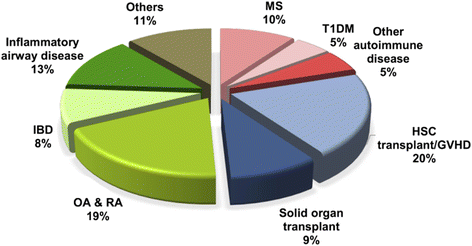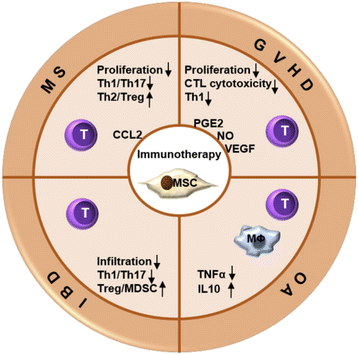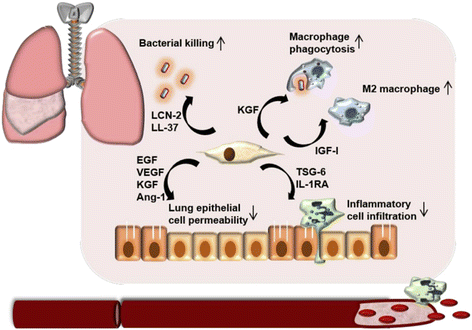Human mesenchymal stem cells (MSCs) for treatment towards immune- and inflammation-mediated diseases: review of current clinical trials
- PMID: 27809910
- PMCID: PMC5095977
- DOI: 10.1186/s12929-016-0289-5
Human mesenchymal stem cells (MSCs) for treatment towards immune- and inflammation-mediated diseases: review of current clinical trials
Abstract
Human mesenchymal stem cells (MSCs) are multilineage somatic progenitor/stem cells that have been shown to possess immunomodulatory properties in recent years. Initially met with much skepticism, MSC immunomodulation has now been well reproduced across tissue sources and species to be clinically relevant. This has opened up the use of these versatile cells for application as 3rd party/allogeneic use in cell replacement/tissue regeneration, as well as for immune- and inflammation-mediated disease entities. Most surprisingly, use of MSCs for in immune-/inflammation-mediated diseases appears to yield more efficacy than for regenerative medicine, since engraftment of the exogenous cell does not appear necessary. In this review, we focus on this non-traditional clinical use of a tissue-specific stem cell, and highlight important findings and trends in this exciting area of stem cell therapy.
Keywords: Autoimmune disease; Clinical trials; Human; Immunomodulation; Inflammation; Mesenchymal stem cells; Organ transplantation and rejection; Stem cell therapy.
Figures



Similar articles
-
Potential therapeutic applications of mesenchymal stromal cells.Pathology. 2011 Oct;43(6):592-604. doi: 10.1097/PAT.0b013e32834ab72d. Pathology. 2011. PMID: 21876470
-
Are mesenchymal stromal cells immune cells?Arthritis Res Ther. 2015 Mar 31;17(1):88. doi: 10.1186/s13075-015-0596-3. Arthritis Res Ther. 2015. PMID: 25880839 Free PMC article. Review.
-
Human mesenchymal stem cells - current trends and future prospective.Biosci Rep. 2015 Apr 28;35(2):e00191. doi: 10.1042/BSR20150025. Biosci Rep. 2015. PMID: 25797907 Free PMC article. Review.
-
[Bone and Stem Cells. Isolation and immunomodulation of mesenchymal stem cells].Clin Calcium. 2014 Apr;24(4):575-83. Clin Calcium. 2014. PMID: 24681504 Review. Japanese.
-
Mesenchymal stem cells and immunomodulation: current status and future prospects.Cell Death Dis. 2016 Jan 21;7(1):e2062. doi: 10.1038/cddis.2015.327. Cell Death Dis. 2016. PMID: 26794657 Free PMC article. Review.
Cited by
-
Bioactive Lipids as Mediators of the Beneficial Action(s) of Mesenchymal Stem Cells in COVID-19.Aging Dis. 2020 Jul 23;11(4):746-755. doi: 10.14336/AD.2020.0521. eCollection 2020 Jul. Aging Dis. 2020. PMID: 32765941 Free PMC article.
-
Mesenchymal Stem Cells Adaptively Respond to Environmental Cues Thereby Improving Granulation Tissue Formation and Wound Healing.Front Cell Dev Biol. 2020 Jul 29;8:697. doi: 10.3389/fcell.2020.00697. eCollection 2020. Front Cell Dev Biol. 2020. PMID: 32850818 Free PMC article. Review.
-
Mesenchymal Stem Cells: a Potential Treatment Approach for Refractory Chronic Spontaneous Urticaria.Stem Cell Rev Rep. 2021 Jun;17(3):911-922. doi: 10.1007/s12015-020-10059-w. Epub 2020 Oct 22. Stem Cell Rev Rep. 2021. PMID: 33089453
-
Effects of human amnion-derived mesenchymal stem cells and conditioned medium in rats with sclerosing cholangitis.Am J Transl Res. 2018 Jul 15;10(7):2102-2114. eCollection 2018. Am J Transl Res. 2018. PMID: 30093947 Free PMC article.
-
Metabolism in Human Mesenchymal Stromal Cells: A Missing Link Between hMSC Biomanufacturing and Therapy?Front Immunol. 2019 May 8;10:977. doi: 10.3389/fimmu.2019.00977. eCollection 2019. Front Immunol. 2019. PMID: 31139179 Free PMC article. Review.
References
-
- Von Bahr L, Batsis I, Moll G, Hagg M, Szakos A, Sundberg B, Uzunel M, Ringden O, Le Blanc K. Analysis of tissues following mesenchymal stromal cell therapy in humans indicates limited long-term engraftment and no ectopic tissue formation. Stem Cells. 2012;30(7):1575–1578. doi: 10.1002/stem.1118. - DOI - PubMed
Publication types
MeSH terms
LinkOut - more resources
Full Text Sources
Other Literature Sources
Medical
Miscellaneous

